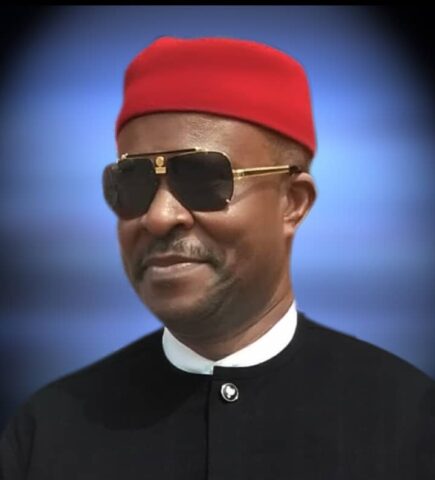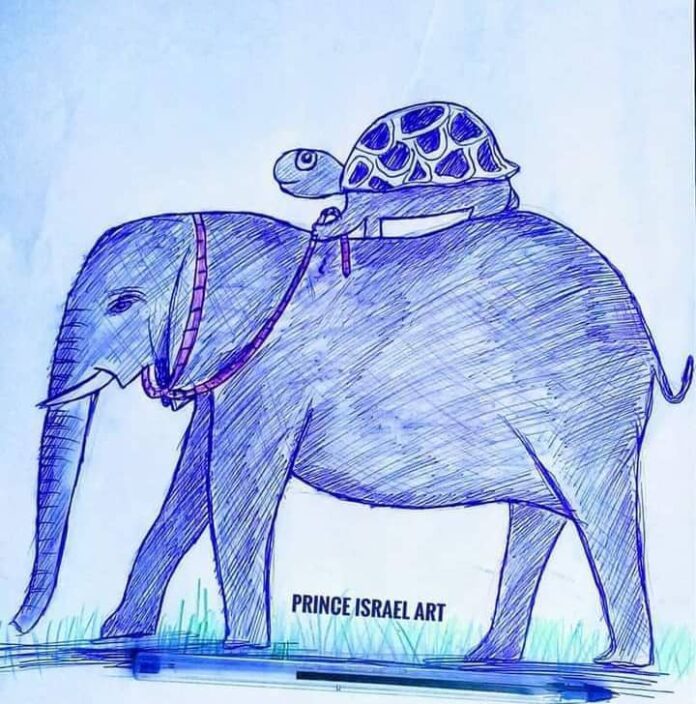Just after I wrote the piece below and shared it, it was pointed out to me that the piece credited to Rufai Oseni was actually written by Jarlath Uche Opara. The reader of my response below should substitute Opara for Oseni. My arguments remains intact, however…… Ugorji O. Ugorji
I read with delight Rufai Oseni’s attempt at interpreting the Gwo Gwo Gwo Ngwo dance craze and the Igbo folklore that has given rise to it in the current context. The courageous journalist and television host did well by paying attention to the underlying story and it’s morals, but his interpretation of the main characters in the story, as they relate to the current context of our modern lives in Nigeria, was off the mark.

Let us put aside the dance for now, because it is only an artifact in the current interest in the folklore. Let’s focus on the story…
Let us also point out that the legendary and super talented Mike Ejeagha was not the original creator of the underlying story. He added original music to the story, but the original story was a gift from Igbo ancients who passed on the story to Ejeagha’s generation. I stand to be corrected.
There are five main characters in the story:
1. The King
2. The King’s Daughter
3. The Elephant
4. The Tortoise
5. The people
I won’t recount or retell the story here. This writer assumes the reader already knows the story and its main characters.
The Daughter
The daughter of the King was the person the King offered for anyone who can bring the mighty elephant to him. Delivering the elephant would be an uncommon feat.
In essence, the daughter is presented as the prize in the story. Historically, including up to now, women (especially the stunningly beautiful ones among them) have been thought of as prizes in the masculine contest for supremacy and influence, or as spoils in wars (again, often a contest among men). I will put aside my human rights (women’s rights) perspective on that historical notion for now. In this context, however (the context of Oseni’s interpretation), the daughter in the story really represents power. Political power – to which, in the Nigerian modern context, accrues wealth. The hand of the King’s daughter in marriage (even if it is a shotgun marriage or arranged marriage) usually comes with wealth and comfort.
The King
Who is the king in this context? Who, in the current reality of Nigeria, is in a position to confer power – political power? The answer is the Independent National Electoral Commission (INEC). You would think that the people would be the ones to confer power, but INEC is ultimately the entity that confers power. The remarkable Rotimi Chibuike Amaechi (former House of Assembly Speaker, former Governor, and former Federal Minister) once told us when the African Writers Endowment hosted him in New Jersey in 2013 that “we the politicians impose ourselves on the people.” However, that imposition only happens with the imprimatur of INEC.
One might argue that the Judiciary (ala the Supreme Court) is the ultimate authority that decides, confers, or certifies “electoral victory” and “political power,” but in the scenario of the story, the King embodies a combination of the Executive and the Judiciary. There were yet no separation of powers. Moreover, the very rare exception of the Supreme Court over-ruling the INEC actually proves the theory of INEC being the real king.
The Elephant
Oseni posits that the elephant is the people, who are often deceived by the tortoise – which he further posits are the politicians.
However, when one pays close attention to the accompanying song, you find that it says in part “enyi na aga, anyi so gi na azu” (keep moving elephant, we are behind you). In other words, the elephant can’t be the same people who are following the elephant or supporting the elephant.
The only unique creature in this scenario that usually leads, that is flamboyant even in his gait (as exemplified in the sound of “Gwo Gwo Gwo Ngwo”) and who the people egg on (in truth or in deceit) is the politician.
The politician, especially the resourceful one, is the elephant. There is virtually no politician seeking power who does not claim that groups (of people) urged him/her or begged him/her to come out and contest. That claim is almost always true. So the elephant in “enyi na aga” is the politician. Every politician gets told by some people that he/she is the best thing since sliced bread, whose “divine mandate” must be actualized or on whose “divine mandate” we stand. I won’t even get into the role of the clergy (in all the religions, including the Igbo religion) in this power game.
Even Barrack Obama told us that one has to be a little self-centered or selfish to think that he or she is the one to be president, governor or senator. Most politicians get told about the divinity of their would-be victory, and many of them in turn employ and deploy deception in the art of the deal. There is no congruency between divinity and deception. I posit that over 95% of those politicians who seek power in a particular contest lose, and thus suffer the fate of the elephant in the story.
The Tortoise
The tortoise is the main protagonist in the story, who strategizes and conceptualizes how to “deliver” the elephant (the politician) to victory or to a loss. In this scenario, the tortoise is Oseni’s professional colleagues (journalists) and political consultants, who are the purveyors of truth and falsehood (deception) in the contest for power – the contest for the King’s daughter. And how are journalists referred to even till today in Nigeria? “Gentlemen of the press.”
The People
A background character in the story is the people, which includes the story teller. One cannot divorce the story creator and subsequent tellers of the story from the story. The story teller is the original historian, from among the people.
The cheering of the elephant by the people is conditioned on whether the dance steps of the elephant (politician) is in sync with the interests of the people. Where the dance steps are totally selfish, as was the case in the folktale, the elephant suffers the kind of fate we see in the story.
The objective story teller is not really concerned with morality or the moral of the story. History often reflects the perspective of the victor. The tortoise, in all of its exploits (I have written two volumes of collection of stories about the tortoise in book form) is concerned about one thing and only one thing – winning or prevailing or overcoming.
But the story teller, who is from among the people, tips his/her hand in whom he/she allows to prevail. Among the Igbo, the tortoise is the most prevalent character in our folktales. It is almost always the underdog and it often suffers setbacks, but it is never over for him until he overcomes. These numerous tales with the tortoise as the central character, in part, explains the Igbo uncommon drive to overcome. Overcome everything, no matter the apparent nature of the hopelessness at any given time or in any given situation.
So, who seemingly prevailed in the story of Enyi (the elephant) and his friend Mbe (the tortoise)? If you eschew morality, most observers would say the tortoise won. And who have we established the tortoise is? Gentlemen of the press. It is not by mistake that the press is deemed the fourth estate in power and governance.
Like lawyers in every contestation, journalists tend to smile to the bank, regardless of who “wins.”
That’s my take. And I am sticking to it.
Dr. Ugorji Okechukwu Ugorji is a publisher, a scholar-activist, and an author of ten books, including two titles on African folktales, “The Adventures of Torti: Tales from West Africa, ” and “The Crow Bride and Other Torti Tales.” He was the pioneer Commissioner for Homeland Security, Imo State, and he writes from Owerri.







